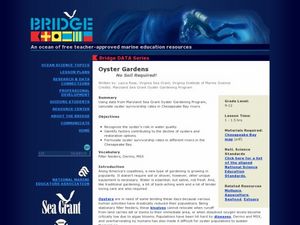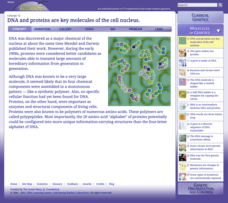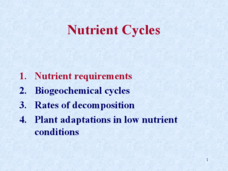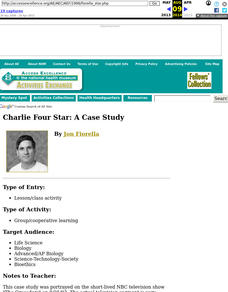National Sailing Hall of Fame
Sailboat Design Requirements
Sailboat design requires more than a half-circle and triangle sketch. After viewing a slideshow presentation that outlines the requirements for sailboat design, learners draw a design, perform the needed calculations, and write a paper...
Baylor College
Animals' Needs
Explore the wonderful world of earthworms as your class learns about the requirements of animal life. After building soda bottle terrariums, students observe worms over the course of a couple weeks, building an understanding that all...
EngageNY
Mid-Unit Assessment: Close Reading of Bullfrog at Magnolia Circle: Bullfrog Life Cycle
The sixth lesson plan in this Bullfrog at Magnolia Circle unit assesses your third graders' ability to read and understand informational text. The included assessment asks learners to take notes about the main idea and supporting details...
Baylor College
Fossil Fuels and the Carbon Cycle
Humans are quickly depleting Earth's fossil fuels and locating them is becoming increasingly difficult! Layered muffins are used for models as young geologists take core samples in order to determine the presence of oil. Consider first...
Kenan Fellows
Isotopic Pennies
Many people confuse atomic mass and atomic numbers. The sixth of seven lessons in a unit requires scholars to find the weight of different groups of pennies. Then, they must solve how many of each type of penny exists in a closed system...
Curated OER
Oyster Gardens - No Soil Required!
Explore the practice of oyster gardening. Because oysters play a vital role in marine ecosystems and their populations have declined, biologists are transplanting oyster seed to repopulate reefs. After learning about this practice,...
Berkshire Museum
The Three Life-Giving Sisters: Plant Cultivation and Mohican Innovation
Children gain first-hand experience with Native American agriculture while investigating the life cycle of plants with this engaging experiment. Focusing on what the natives called the Three Sisters - corn, beans, and squash - young...
Institute of Electrical and Electronics Engineers
Arduino Blink Challenge
Emerging engineers read about Arduino software and how it can be used. Then they follow a nine-step tutorial to connect an Arduino board to a computer and put it to work! The objective is to code a program that will cause an LED to...
Chicago Botanic Garden
Are All Plants Created Equal?
Photosynthesis requires energy and produces food, and cellular respiration produces energy and requires food. An interesting lesson analyzes the factors that affect the rates of photosynthesis and respiration. Classes spend one day...
Cold Spring Harbor Laboratory
DNA and Proteins Are Key Molecules of the Cell Nucleus
When DNA research first began, it required almost an entire day to extract the molecules from a cell nucleus. Now it requires less than an hour. Scholars learn about the early theories of DNA with an online interactive, videos,...
BioEd Online
Butterflies in Space
How does gravity affect the life cycle of a butterfly? Learn first-hand what types of investigations astronauts perform in space by following along with one of NASA's experiments. Create butterfly habitats in the classroom with specific...
CK-12 Foundation
Crash Test Dummy
Why are car manufactures required to install seat belts and airbags; do they really make that big of a difference? Scholars use a simulator to determine the amount of force dissipated by a seat belt and airbag in a head-on crash. This is...
Serendip
How Do Muscles Get the Energy They Need for Athletic Activity?
Every muscle movement requires energy, but where does that energy come from? Scholars answer this question and more as they complete a worksheet. By following the directions, completing research, and discussing it as a class, they begin...
College Board
2015 AP® Physics 2: Algebra-Based Free-Response Questions
As one of the few AP tests that count for second year college course credit, the AP Physics 2 exam requires a higher level of knowledge than most. Help young scientists study for their upcoming AP Physics 2 exams with previous...
Curated OER
Identify Plant Nutrient Requirements
Learners are given standard elemental nutrients, identify plant nutrient requirements based on criteria outlined in assessment instructment. They, are given standard elemental nutrients, provide all means and chemical symbols of plant...
Baylor College
Do Plants Need Light?
Turn your classroom into a greenhouse with a lesson on plant growth. First, investigate the different parts of seeds, identifying the seed coat, cotyledon, and embryo. Then plant the seeds and watch them grow! Measure the new plants...
Baylor College
Safe Food Preparation
Who doesn't love ice cream? Make this delicious dessert with your class while learning about food preparation in the tenth lesson of this series. Teach about the importance of cleanliness and proper cooking techniques in order to avoid...
Curated OER
Nutrient Cycling
AP environmental science or college-level ecology classes will glean a tremendous amount of information on nutrient cycles from this detailed PowerPoint. It covers nutrient requirements, biogeochemcial cycles, decomposition rates, and...
Curated OER
Charlie Four Star: A Case Study
Engage in a class debate dealing with the allocation of organs to those waiting for a transplant. How do they decide who gets a transplant and who doesn't? Learners attempt to determine what is fair for the individual requiring an organ...
Curated OER
Real-World Projects: Challenges from the Polymer Industry
Two scenarios are presented for chemistry detectives to decipher. Both require the use of an infrared spectrometer and focus on the examination of polymer materials. In the first, lumps in polyethylene bottles are analyzed. In the...
Curated OER
Survival: The Human Body in Extreme Environments
Students name and describe the major systems that work together as a unity to monitor and regulate the human body as it goes about its business of securing the essential requirements for life. They identify specific human features and/or...
Curated OER
Edible GMOs?
The debate over genetically modified organisms is on! Young biologists imagine that they have been asked to choose which corn chips will be sold for a fundraiser, one made with GMOs or one without. This four-day lesson plan requires...
Curated OER
2008 U.S. National Chemistry Olympiad Part III
In this chemistry olympiad lab worksheet, chemists are required to design two experiments. In one, they design an experiment to identify seven solutions given to them in pipettes. In the other, they design an experiment to determine the...
Curated OER
2001 U.S. National Chemistry Olympiad National Exam Part II
Only eight problems are on this competitive national chemistry exam. It required the balancing of chemical equations, solving stoichiometry questions, and more. This is part two of three of the national exam. Also available is a local...
Other popular searches
- Academic Requirements
- Reserve Requirements
- High School Requirements
- Daily Nutrient Requirements
- Graduation Requirements
- Bacteria Growth Requirements
- Education Requirements
- Voting Age Requirements
- Educational Requirements
- Municipal Requirements
- Fire Flow Requirements
- Work Safety Requirements

























